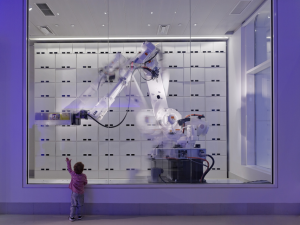Have you noticed the steady increase in automation and smart machines being embedded into every aspect of your daily life?
 Uber uses a smartphone application to connect passengers with drivers, which has automated and replaced the traditional taxi dispatcher. The Yotel New York hotel in New York City has completely automated the check-in process with smartphone applications, touchscreens and a robot that picks up your luggage and stores it while your room is being prepared. Hointer has completely automated the in-store retail shopping experience via your smartphone. And, this year both Amazon and Google introduced to the world to their prototypes for flying drones that will someday replace current home delivery services of physical goods. The list goes on and on.
Uber uses a smartphone application to connect passengers with drivers, which has automated and replaced the traditional taxi dispatcher. The Yotel New York hotel in New York City has completely automated the check-in process with smartphone applications, touchscreens and a robot that picks up your luggage and stores it while your room is being prepared. Hointer has completely automated the in-store retail shopping experience via your smartphone. And, this year both Amazon and Google introduced to the world to their prototypes for flying drones that will someday replace current home delivery services of physical goods. The list goes on and on.
A recent video article in The Economist discusses the effects of automation on the workforce. It basically outlines that the digital revolution offers great advantages but it also threatens the jobs of low and mid-skilled workers. Globalization, the financial meltdown and the digitalization of everything is pushing businesses to do more with less; which is really nothing new.
Companies have always looked for ways to produce more with less labour. Machines have always been better, faster and can produce more volume, which leads directly to a company’s increase in profit. And in the past these machines have traditionally been dumb machines. We are now moving towards smarter machines that learn from the data we feed them and will start to replace people-based tasks in ways that you or I can’t even imagine.
Becoming a digital-first business starts with people
We often consult with senior executives that look confused, frustrated and scared that their business could be irrelevant tomorrow due to the ever-changing digital landscape. Either their competitors will find new ways to disrupt the marketplace or a start-up like Uber will. What they are really worried about is that they will become irrelevant inside their own business.
Every business in one way or another is becoming a digital business. Forrester published a great report on this very topic earlier this year, “The Future Of Business Is Digital.” In the report they outline that 74 per cent of today’s business executives say their company has a digital strategy, but only 15 per cent believe that their company has the skills and capabilities to execute on that strategy. This is a huge gap.
For the past 20 years, the small digital-savvy groups that have operated inside business units and marketing departments have been focused on building digital customer experiences – websites, mobile apps, social platforms, etc. However, today everyone across the organization has to think digital. From HR to operations and finance to distribution. Business executives have to invest in education, rethinking org structures and updating old processes to meet the demands of the digital revolution. They need to feed their people across the organization and take a digital first position.
Invest in people first, not machines
Transforming your business to a digital business is not an overnight process. All businesses today are at some point along the digital transformation journey. But far too often organizations turn to building proprietary technology instead of first investing in their people. The truth is; it’s a balance of building, buying and investing in talent. But, finding the right talent, educating and mentoring the new digital leaders needs to be a priority.
Many businesses today are doing the following to become a digital-first business:
- Educating C-suite executives on the basics of digital, mobile and social platforms
- Investing in monthly hands-on interactive workshops
- Embedding digitally-savvy employees into traditional businesses units to act as digital translators
- Creating Digital Centers of Excellence or Innovation Labs
- Partnering with and/or buying digital start-ups.
Recently we have seen a steady increase in requests for digital workshops from our key clients. We invite executives, mid-level managers and junior staff to spend two days with us, level-setting their understanding of digital. Like the business itself, everyone in the business is at a different point along their digital journey. So, during these digital marketing workshops we provide the following:
- An overview, supported by data, outlining who the new digital customer is
- Basic digital principles and an operating framework/process
- Hands-on workshop activities that allow participants to apply the framework to their business.
The feedback from these workshops has been interesting. Attendees are most interested in two things. First, everyone is speaking the same language. In other words, they’re using fewer buzz words! Second, participants are collaborating with their peers and applying a framework/process to solve real world problems with cross functional teams.
You see, becoming a digital-first business has less to do with cool case studies about smart machines and new digital technologies that are disrupting the marketplace. It has everything to do with the basic human need to interact and learn from one another. Yes, machines are getting smarter and yes they will continue to replace people-based tasks. But businesses will always need smart people who think of new ways to apply these smart machines to better meet the needs of their customers.
[Photo: Yotel New York]
Great post. Managers in the near-future will need to develop new skills in not only getting the most out of its digital-savvy people, but in how to best-leverage artificial intelligence to achieve their business objectives.